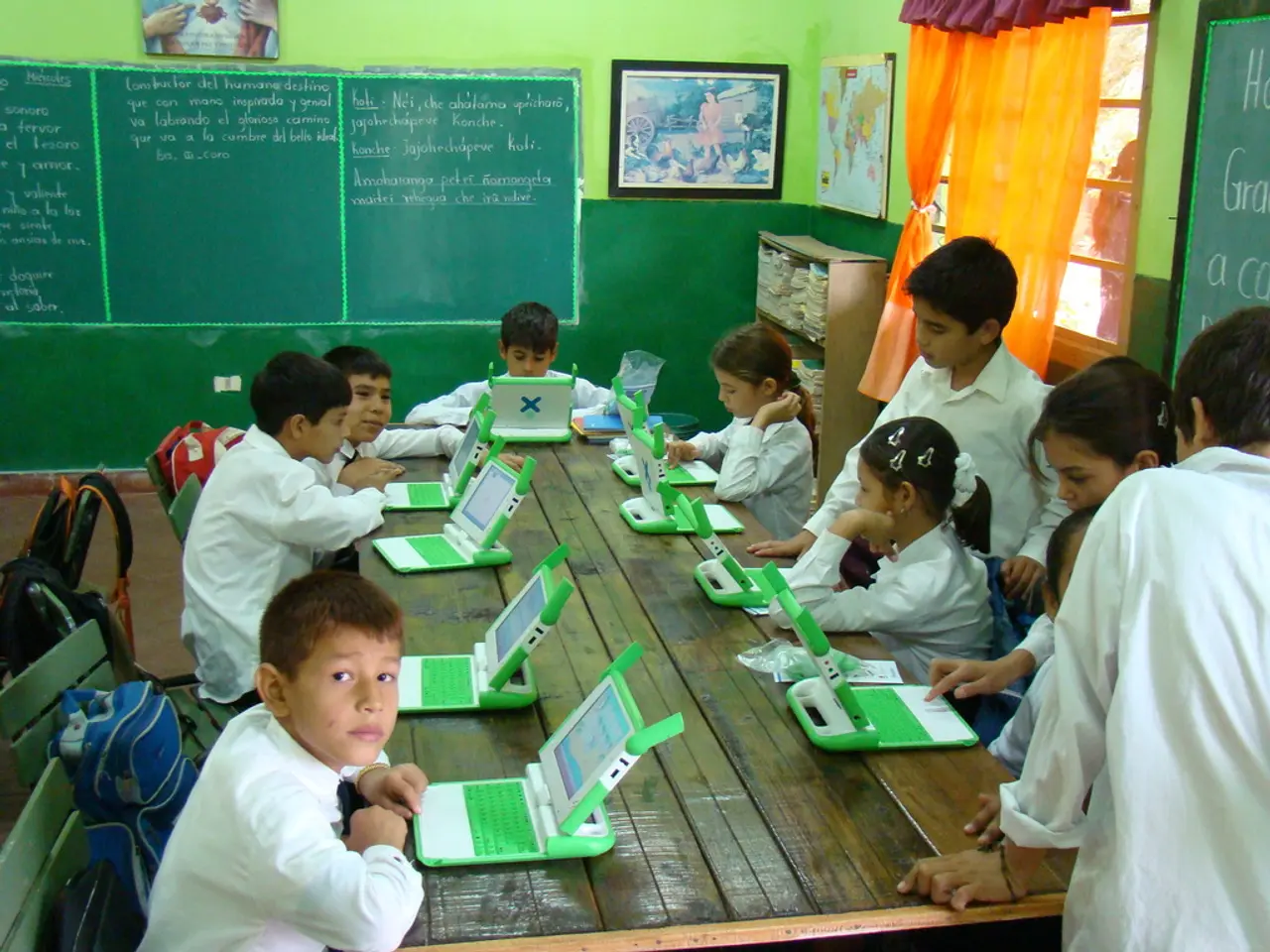Essential Cybersecurity Guidance and Hands-On Learning Opportunities for School Curriculum in Kindergarten to 12th Grade
In the digital age, understanding cybersecurity has become crucial for everyone, especially for young learners. Fortunately, a wealth of resources is available to educators, offering comprehensive curricula and interactive activities from reputable organizations.
Comprehensive Cybersecurity Curricula
CyberSmart's K-12 Curriculum
CyberSmart offers a free K-12 curriculum with 85 original lessons aligned to tech standards, making it well-suited for structured teaching across grade levels. The program provides a balanced approach, emphasizing digital citizenship and security concepts appropriate for varying developmental stages [1].
CISA's K-12 Cybersecurity Resources
The Cybersecurity and Infrastructure Security Agency (CISA) also provides additional cybersecurity curricula and tools designed specifically for K-12 educators to integrate into classrooms or after-school activities [1].
EC-Council's Free Beginner Courses
EC-Council offers free beginner courses with interactive labs and certifications, which can enhance student engagement, especially in high school grades. These courses cover practical cybersecurity topics that could be adapted for older K-12 students interested in more advanced concepts [2].
Specialized Programs and Supplementary Curricula
Local Hands-on Classes
Local programs such as the free cybersecurity introductory college course for high school students at Leeward Community College demonstrate how hands-on, mentorship-driven experiences can complement classroom learning [4].
AI Literacy Curricula
While not strictly cybersecurity, free AI literacy curricula like those from Skill Struck also support the development of foundational digital skills for K-12 students, helping to build broader technology awareness alongside cybersecurity topics [5].
Specific Lessons and Activities
Cybersecurity Basics for Young Learners
- Password Power-Up: A standards-aligned lesson that teaches grade three kids about one of the most important fundamentals of internet security.
- CEOP Education: Band Runner: A music-themed game designed to help 8-10 year olds learn how to stay safe online.
- ABCYa: Cyber Five: An animated video and quiz that introduces five basic internet safety rules for younger students.
- Safety in My Online Neighborhood: A basic lesson for kindergarten that teaches kids how to use the internet safely using real-world examples.
Intermediate and Advanced Topics
- Faux Paw the Techno Cat: An animated character used in lessons to engage young learners in understanding digital ethics, cyberbullying, safe downloading, and other cyber topics.
- Hacker Highschool: A self-guided curriculum for teens aged 12-20, consisting of 14 free lessons in 10 languages, covering various cybersecurity topics.
- SonicWall Phishing IQ test: A 7-question quiz that tests students' ability to spot phishing attempts.
- International Computer Science Institute: Teaching Security: Offers three standards-aligned lessons on threat modeling, authentication, and social engineering attacks, ideal for high school students.
Resources on Cybersecurity Education
- Malware and Phishing: What Educators Need to Know and Cybersecurity in the Classroom: What Teachers Can Do: Resources about the importance of cybersecurity education in the classroom.
- CyberPatriot Elementary School Cyber Education Initiative (ESCEI): Provides a free digital kit with three interactive learning modules, supplementary slides, instructor's guide, certificate templates, and more to plan K-6 cybersecurity curriculum.
These resources are designed to be accessible for educators and provide engaging content that adapts to students’ grade levels and learning contexts. By incorporating these materials into their teaching, educators can help foster a generation of digitally savvy, cybersecurity-aware students.
[1] CyberSmart’s K-12 Cybersecurity Curriculum: https://cybersmart.org/k12-curriculum/ [2] EC-Council Free Beginner Courses: https://www.eccouncil.org/free-cybersecurity-training/ [3] CISA’s K-12 Cybersecurity Resources: https://www.cisa.gov/k12 [4] Leeward Community College Cybersecurity Course: https://www.leeward.hawaii.edu/academics/programs/cybersecurity/ [5] Skill Struck AI Literacy Curriculum: https://www.skillstruck.com/ai/
- Teachers can utilize CyberSmart's K-12 curriculum, which includes 85 original lessons aligned to tech standards, for structured teaching across various grade levels, emphasizing digital citizenship and security concepts suitable for different developmental stages.
- The Cybersecurity and Infrastructure Security Agency (CISA) provides additional cybersecurity curricula and tools designed specifically for K-12 educators, offering resources that can be integrated into classrooms or after-school activities.
- EC-Council offers free beginner courses with interactive labs and certifications, enhancing student engagement, particularly for high school grades, and covering practical cybersecurity topics suitable for advanced K-12 students.
- Local programs such as free cybersecurity introductory college courses, like the one at Leeward Community College, provide hands-on, mentorship-driven experiences that complement classroom learning.
- Free AI literacy curricula from Skill Struck help develop foundational digital skills for K-12 students, supporting broader technology awareness and incorporation of cybersecurity topics into the curriculum.
- Teachers can incorporate various engaging lessons and activities into their curriculum to teach both basic and advanced cybersecurity concepts, such as the Password Power-Up lesson, CEOP Education: Band Runner game, and International Computer Science Institute's threat modeling, authentication, and social engineering attack lessons.




